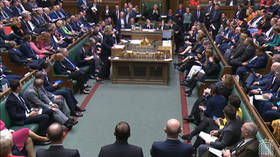
There will be no retrial in the Brittany Higgins case after news of her poor mental health
Graham Hryce is an Australian journalist and former media lawyer, whose work has been published in The Australian, the Sydney Morning Herald, the Age, the Sunday Mail, the Spectator and Quadrant.
Graham Hryce is an Australian journalist and former media lawyer, whose work has been published in The Australian, the Sydney Morning Herald, the Age, the Sunday Mail, the Spectator and Quadrant.

CANBERRA, AUSTRALIA – FEBRUARY 09: Brittany Higgins, a former Liberal Party staff member addresses the media at the National Press Club on February 09, 2022 in Canberra, Australia. © Photo by Lisa Maree Williams/Getty Images
Recent developments in the Brittany Higgins lawsuit – Australia’s most infamous #MeToo case – have cast a very unflattering light on the way the #MeToo movement and its supporters operate.
Last week, it became clear for the first time that the movement has turned Ms Higgins into a traumatized victim, who it continues to exploit – while, at the same time, seriously besmirching the integrity of the Australian Capital Territory legal system.
This is hardly surprising – Higgins is not the first #MeToo complainant to be irreversibly damaged by the demands of the movement, and activists and supporters have always shown blatant contempt for due process and the rule of law.
Higgins’ downward spiral began in early 2021, when she sensationally claimed in media interviews that a fellow political staffer in Parliament House in Canberra had raped her after a night of excessive drinking two years earlier. Higgins was immediately feted by the #MeToo movement and its zealous advocates in the media and enlisted her in their political campaign to destroy the conservative Morrison government.
Higgins then filed a complaint with the police, and her alleged rapist, Bruce Lehrmann, was charged with sexual assault – a crime that carries a penalty of 12 years’ imprisonment. Lehrmann denied that he had had sex with Higgins and pleaded not guilty. The case went to trial in the Australian Capital Territory Supreme Court in Canberra in October this year.

Read more
After deliberating for almost a week, the jury could not reach a unanimous verdict – and then, by chance, it was discovered that a jury member had improperly accessed research material, notwithstanding numerous directions from the trial judge telling the jury that this was impermissible. The trial was aborted, and a retrial was set down for February next year. There the matter rested until the remarkable events of late last week.
Last Friday, Shane Drumgold, the ACT Director of Public Prosecutions who had prosecuted Lehrmann, dramatically announced that the retrial would not proceed because of serious concerns over Higgins’ mental health. At a press conference, an emotional Drumgold said “In light of the completely independent medical opinions, I’ve made the difficult decision that it is no longer in the public interest to pursue a prosecution at the risk of the complainant’s life.”
He went on to say that he remained of the view that there were “reasonable prospects” of a jury convicting Lehrmann at the retrial – thereby suggesting that Lehrmann was, in fact, guilty as charged. So much for the presumption of innocence in the ACT.
Drumgold then said, “during the investigation and trial, as a sexual assault complainant Ms Higgins has faced a level of personal attack I’ve not seen in over 20 years of doing this work”
This comment is a disgraceful attack on the lawyers who represented Lehrmann at the first trial – who were, in fact, complimented by the trial judge for the way they had conducted themselves at the trial.
It also ignores the fact that media coverage of the entire Higgins saga has been, with few exceptions, uniformly favorable to Higgins – not surprisingly, given that it had been orchestrated by the #MeToo movement and those journalists that support it. It was the media campaign that caused Lehrmann to bring an application – which the ACT Supreme Court rejected – to have his prosecution permanently stayed, and which, in my view, meant that it was impossible for him to receive a fair trial.
And recently, it was reported in the press that, after the first trial had been aborted, Drumgold wrote to the ACT Attorney General asking him to change the existing law so as to permit the retrial to take place without Higgins having to give evidence in person. This request was praised by #MeToo advocates in the media – even though such a change to the existing law would have severely disadvantaged Lehrmann and made a conviction easier for Drumgold to obtain at the retrial.
Media reports over the weekend then revealed a number of extraordinary facts – previously not known to the public.
First, it was disclosed that, during the first trial, Higgins had suffered a severe mental breakdown and had been hospitalized for four days.
Second, it was revealed that Higgins is currently in the hospital suffering from acute mental health problems.
Read more
Third, leaked documents disclosed that senior police officers who had investigated Higgins’ complaint had recommended that Lehrmann not be charged – on the grounds of insufficient evidence, inconsistencies in Higgins’ account of events, and the fact that her mental health was such that she may not be able to cope with giving evidence at trial.
More importantly, one document stated that these police officers had been unable to prevent Lehrmann’s prosecution by the DPP because “there is too much political interference.”
These recent developments, and significant disclosures of previously unknown facts, raise serious questions about the entire prosecution of Bruce Lehrmann. Should he have been prosecuted at all? Was there any ‘political interference’?
And if, as Drumgold asserted during Friday’s press conference, “the safety of a complainant in a sexual assault matter must be paramount,” why was the prosecution brought when senior police had already drawn attention to Higgins’ fragile mental state?
It is now perfectly clear that the Higgins case has been a complete and utter legal debacle from beginning to end – and that it reflects very poorly indeed on the basic integrity of the entire ACT legal system. And the ACT Supreme Court’s failure to punish clear contempt of court by Higgins and her supporters ha seriously weakened its authority.
It is, however, the #MeToo movement itself that bears ultimate responsibility for the wretched situation that Higgins now finds herself in.
Those activist journalists that took up her cause never critically examined or tested her allegations. Instead, they turned her into an instant celebrity and an icon of the movement. They then used her to campaign against the Morrison government – a role for which she was intellectually and emotionally totally unsuited.
Higgins’ naivety and fragility should have been obvious to her #MeToo handlers from the beginning. She obliquely acknowledged this in her evidence at the first trial when she criticized those journalists who took up her cause “for making it about them, rather than me.”
Higgins only brought criminal proceedings against Lehrmann after she had been taken up by the #MeToo movement, and two years after the alleged rape. Did Higgins’ #MeToo supporters encourage her to do so? Did they ever tell her precisely what this would entail for her? Did they explain to her in detail how the criminal justice system works?
Why did they encourage her to make an incendiary speech denouncing Lehrmann and the legal system to the assembled media at the end of her first trial – which may still result in contempt and criminal charges being brought against her? Higgins republished the text of this speech online on the weekend – thereby thumbing her nose again at the ACT legal system.
I suspect that the answer to these questions lies in the simple fact that the #MeToo movement always places its own interests above those of the individuals that it purports to act on behalf of.
Even now – with Higgins in the hospital – the #MeToo movement refuses to take any responsibility whatsoever for her predicament. Instead, its supporters blame her fate on the alleged iniquities of the legal system.
Would Higgins be in the hospital today if she had filed a police complaint immediately after the alleged rape, proceeded to trial in the normal way, and never had anything to do with the movement or its ideologues in the media? Of course not.

Read more
Even more reprehensibly, this weekend, #MeToo journalists continued to write lurid articles about her mental health problems. It must be very gratifying for them to know that, even hospitalized, Higgins is still capable of generating reams of sensationalist copy.
And Ms Higgins’ problems are far from over yet. Her lucrative book deal – for which she was to receive a $350,000 advance last year – now appears to be in danger of falling through, given that Lehrmann will never be convicted of raping her.
Lehrmann is now considering suing the ACT authorities for malicious prosecution, as well as bringing defamation actions against those media organizations that uncritically published Higgins’ allegations. And on Sunday, press reports appeared stating that Higgins intends to sue the federal government for “three million dollars.”
It is not clear what the basis for her claim is, but any legal proceedings would raise the prospect of her giving evidence in court. So, having been totally traumatized by her court appearance at the Lehrmann trial, she is now apparently contemplating – likely in desperation – initiating yet another legal action.
The fact that such a claim could even be contemplated – given the basic facts at the heart of the Higgins saga – shows just how far the legal system has cravenly capitulated to the #MeToo movement.
And now, calls are growing for Drumgold to resign, and a bitter dispute has broken out in the media between Drumgold and the police – with each accusing the other of behaving improperly during the Higgins matter. It now appears that the ACT government will be obliged to establish a judicial enquiry into the entire Lehrmann prosecution.
Two important lessons can, I think, be gleaned from the Brittany Higgins saga.
First, that the #MeToo movement is essentially an irrational movement that has no compunction about reducing those individuals that it purports to “empower” to the status of permanently damaged victims. This is a strange kind of empowerment.
And, second, that any legal jurisdiction that succumbs to the movement’s illiberal ideological demands inevitably brings itself into utter and well-deserved disrepute.
The statements, views and opinions expressed in this column are solely those of the author and do not necessarily represent those of RT.




